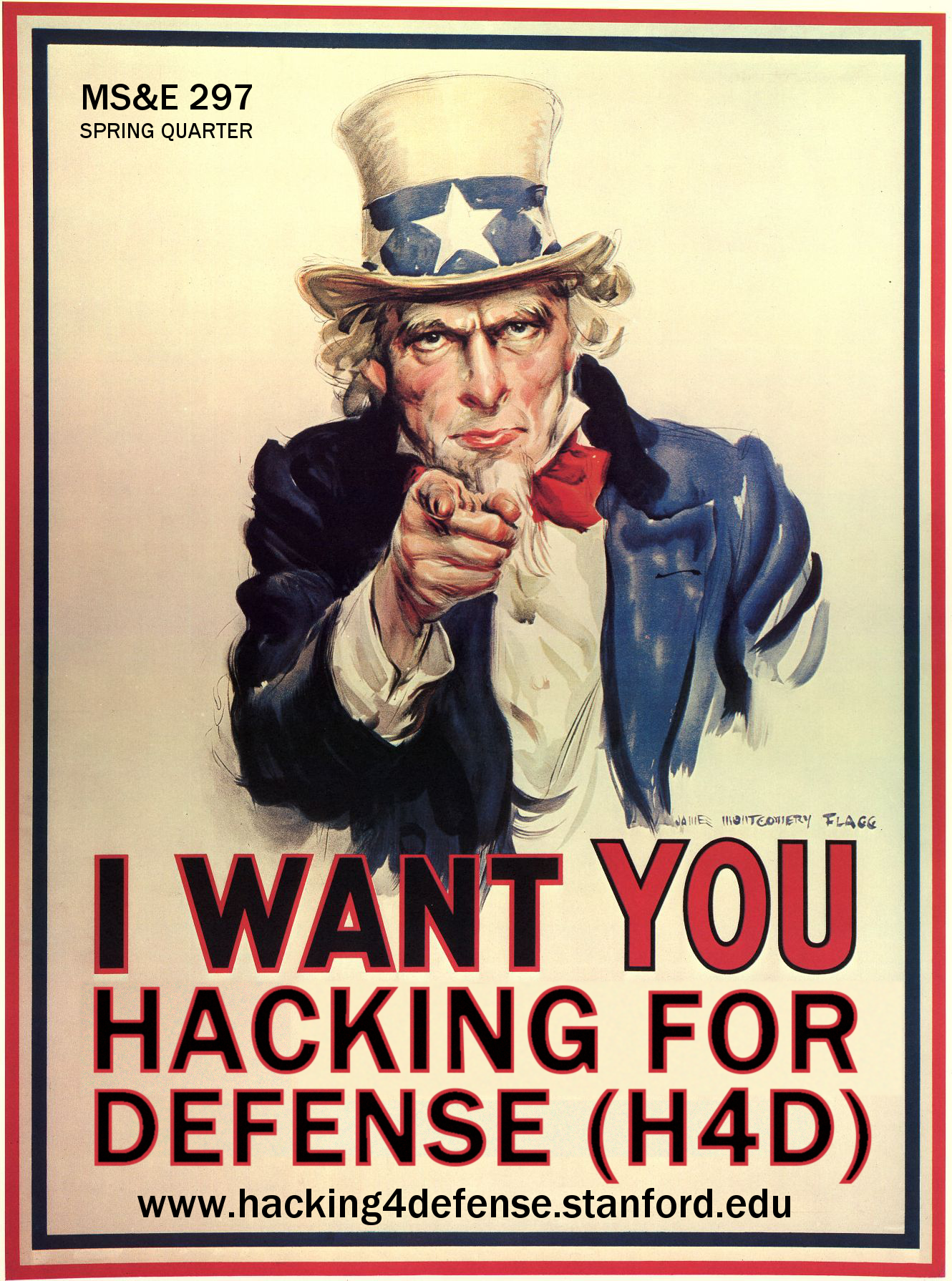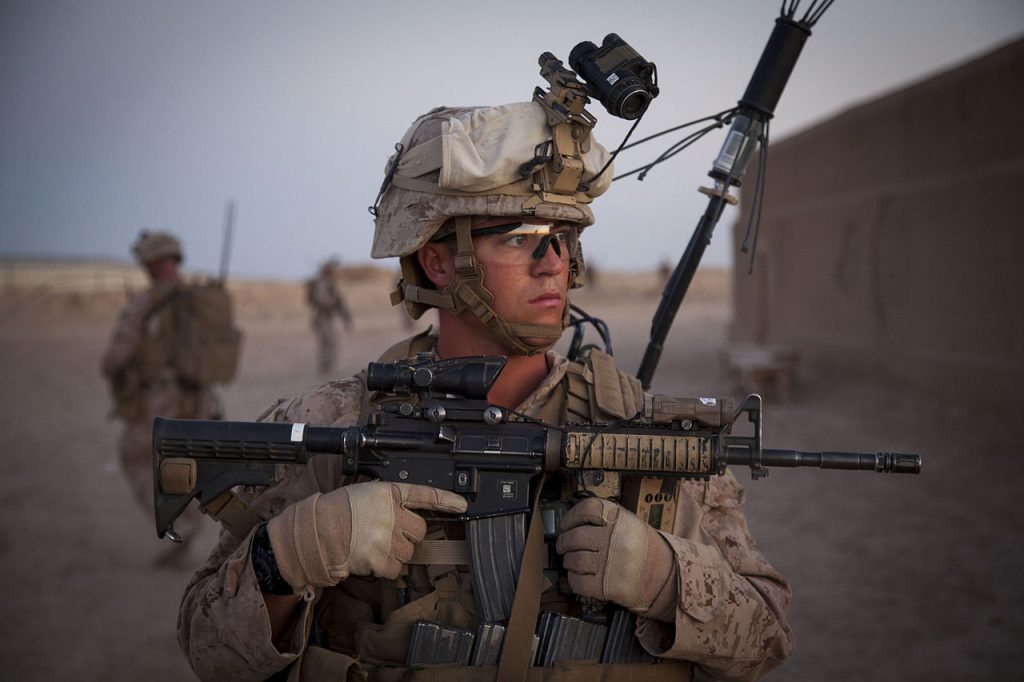
Terrorists rapidly leveraging today’s technology are threatening the safety of our country. So some of Stanford’s top entrepreneurship educators are turning their students’ eyes from the tech industry to national security.
This spring, Stanford’s School of Engineering will offer the course Hacking for Defense: Solving National Security Issues with the Lean Launchpad. Its teaching team will be led by renowned entrepreneurship educators Tom Byers and Steve Blank – creator of the “Lean LaunchPad” methodology. They will be joined by faculty who ran some of the military’s most agile organizations and scholars who have served at some of the highest levels in the military.
In addition, former U.S. Secretary of Defense William Perry, an emeritus professor in Stanford’s Department of Management Science & Engineering (MS&E), will be the course advisor.
The goal of the course (MS&E 297) is to connect the Silicon Valley innovation culture and mindset to the Department of Defense and intelligence community.
Graduate students across the university can apply in teams to take the course and are encouraged to attend one of the brown-bag lunches and information sessions being held this month to learn more.
In a recent blog post, Blank points to ISIS, al- Qaeda, North Korea, Crimea and Ukraine as potential foes that threaten to disrupt America’s national security by harnessing the power of social networks, encryption, GPS, low-cost drones and 3-D printers. And whether they know it or not, these adversaries are using the lean startup methodology, which Blank developed. It emphasizes rapid development and deployment of products – without fear of failure or blowback.
“Terrorists today live on the ‘net and they are all early adopters,” writes Blank, who also teaches the course The Lean LaunchPad: Getting Your Lean Startup Off the Ground (ENGR 245).
“They don’t need an office in Silicon Valley to figure out what’s out there,” he continues. “They can crowd-source designs, find components through eBay, fund through PayPal, train using virtual worlds and refine tactics, techniques and procedures using massive on-line gaming. All while we’re still writing a Request for a Proposal from within the US Government procurement and acquisition channels.”
Blank’s co-instructor, retired Army Special Forces Colonel Joe Felter, hopes students at Stanford will step up and lend their entrepreneurial minds and talents to the cause. Felter, a senior research scholar at Stanford’s Center for International Security and Cooperation (CISAC) and research fellow at the Hoover Institution, understands the challenges and opportunities that tomorrow’s technologists face should they decide to focus on the national-security space.
After earning a Ph.D. in political science at Stanford in 2005, Felter helped stand up and lead the Combating Terrorism Center at the U.S. military academy West Point, and later led the International Security and Assistance Force, Counterinsurgency Advisory and Assistance Team in Afghanistan – reporting directly to Gen. Stanley McChrystal and Gen. David Petraeus.
His experiences on the battlefield include serving as platoon leader in the Army’s 75th Ranger Regiment and as a Special Forces team leader and company commander in Southeast Asia. He earned his bachelor’s degree at West Point and his master’s degree at the Harvard Kennedy School, where his academic adviser was none other than Ash Carter, now the U.S. Secretary of Defense.
“The problems are too important not to bring our best people to the table,” Felter said. “We’re going to expose them to the types of challenges that our national security organizations are grappling with.”
The course is presented by STVP, the Stanford Technology Ventures Program, the entrepreneurship education center in the School of Engineering. STVP Director Tom Byers, a professor in management science and engineering, said the partnership with CISAC to offer this new course is truly exciting.
“We want our entrepreneurially minded students to understand that our country needs them just as much as the high-tech industry,” said Byers, who holds the Entrepreneurship Professor endowed chair in the engineering school. “What better way to teach them that they can have a real impact on society than by showing them they can be innovators in the name of national security?”
Students accepted into the course will work in teams on pressing problems facing the Department of Defense, intelligence community and other government agencies. They range from wearable sensors for Navy divers who work in extreme conditions to an app that would aid humanitarian assistance and disaster relief where agencies from the local to international levels need to share information immediately. The teaching team says innovative solutions to these and other problems will help make America safer.

The goal of the course, however, is not to have Stanford students build these products and have them shipped off to the front lines. Nor does the teaching team intend to turn students into entrepreneurs that run off and launch their own startup once the class wraps up. Their mission is to instill an entrepreneurial mindset, and perhaps, a sense of patriotism.
“As an educator, my job is to teach students a way of thinking,” Blank said. “So, if students launch a startup, but I haven’t actually taught them anything, I’m in the wrong business and so is Stanford.”
That said, Blank also notes that Stanford has supported national security by supplying technological expertise in the past. In his series “Secret History,” Blank describes the rise of what he calls “Microwave Valley,” chronicling the decade of 1946 to 1956 as the university became the hub of military and industry contracting in the Bay Area.
While those years aren’t discussed much these days, Blank said Hacking for Defense is a return to the university and its engineering school contributing to national defense – except with “a more mature” understanding about the role of students and society.
If successful, Blank plans to share the course and its materials with universities around the country in hopes of creating something akin to a “tech ROTC” for the 21st century. That’s not much of a stretch considering Blank’s success with bringing the lean startup methodology to other sectors of the government.
So far, 750 teams of scientists have taken a version of Blank’s Lean LaunchPad course, called I-Corps, which is taught at 53 universities around the country. And over the last few years, other federal agencies like the National Institutes of Health, the Department of Energy and the Department of Health and Human Services have started adopting the course to accelerate innovation.
“We’re seeing terrorism in every city, and in every country,” said Blank, a consulting associate professor in MS&E. “Students ought to be engaged in thinking about this, not just thinking about how to graduate. And there’s already a segment of students who do.”

